- Home
- Ian Wallace
Lucifer Comet (2464 CE) Page 10
Lucifer Comet (2464 CE) Read online
Page 10
“Sir,” Zorbin suggested, “please assume that the celestial equator is described by a circle whose radius extends from Saiph to Betelgeuse. Call the Betelgeuse direction 0000 hours, and take it from there.”
13
Was Orion in fact the home constellation of Narfar and the conquest-quarry of Quarfar? Was it Saiph that was the sun of Dora? Did the mysterious five-forty-six gradient, which speeded up space ships and even a comet, extend all the way out to Saiph which was 2100 light-years distant from Erth? To express the distance indicated by 2100 light-years required incomprehensible numerals: in kilometers, the number 2 followed by sixteen zeroes: twenty quadrillion kilometers. On Erth in 2464, light which had departed Saiph in the Age of St. Augustinus was only just now arriving.
These questions were playing tag in the Methuen mind all during dinner at an expensive restaurant (a thing which Quarfar needed to experience, at Norwestian expense) with Zorbin and Dorita and their extraterrestrial guest. All other data at the captain’s command confirmed the bizarre possibilities. The gradient certainly extended as far out as Bellatrix, which was four hundred seventy light-years from Erth, less than a quarter of the distance to Saiph. (If relatively nearby Bellatrix shared the constellation Orion with Saiph and other more distant stars, it was only because our eyes looking at stars flatten distance-differentials the way Grandma Moses flattened perspectives.) The gradient had speeded up the comet to an inordinate degree; Methuen was eager to get at his calculator in order to figure whether the age of the comet when it reached the neighborhood of Bellatrix corresponded to its velocity assuming an origin near Saiph.
And—how dangerous to Erth was this Quarfar?
It was hard, just now, for Methuen to pursue these ruminatings in a disciplined way. His eyes kept going for the charms of girlish Dorita, whose attraction for him had been many times multiplied by her superb committee-aide operation. He was vexed by the paradox of living semi-intimately with Dorita in the same apartment but chaperoned by two other men—one of whom, Quarfar, was monopolizing her time and attention, for reasons functionally necessary to Methuen, but probably for other reasons also. The captain was even noticing with irritation the occasional murmurings between Dorita and Zorbin: the two evidently liked each other, and he kept wondering how much more there might be.
By the time dinner was over and they departed for the apartment (at perhaps 2100 hours), Methuen had blown all his reserve about Dorita. He knew he was in love with her, that he had to have her permanently. At the same time, he was caught in a functional net: she was absolutely necessary to task-force operations, and therefore she had to maintain her mental intimacy with Quarfar; as to Zorbin, she had to be friendly with him even if this should lead to flirtation and perhaps more.
Methuen found that his intellectual self-containment was dissipating into an emotional quagmire. He fought to keep its head above surface. It kept running through his mind, all the way back to the apartment, that if he should confront Dorita with his love, Dorita might settle everything down----
The following he knew for sure. He did not want to have Dorita on even a semi-permanent basis unless she loved him in such a way that she too wanted permanence. And he was not going to wreck his career for love of Dorita; which meant for immediate purposes that he was not going to blow this assignment. And if Dorita truly loved him, she too would value his career as high as the love.
If she loved him. And that he had to learn—or had to win.
And so it became a curiously critical night. Imperative for Methuen to find out tonight about love with Dorita. Equally imperative for Quarfar to push ahead with his intuition about Orion; and that demanded Dorita’s attention to Quarfar and not to Methuen.
In the apartment, Quarfar was moody; and it was a long time before even Dorita could draw him into talking about permanent concerns. Vexed, Methuen had found a moment to tell her that he was eager to talk with her privately; and she had patted his hand and promised some time later on.
The promise had buoyed Methuen; Dorita had hardly noticed it, so deeply was she involved with the Quarfar adventure.
Eventually, though, Quarfar adressed Zorbin; Dorita, sitting next to Quarfar on the sofa, mind-listened attentively to fill out the chopped words. Said the alien in Anglian: “At— planetarium?—I point to star—you say something to Methuen. What you say?”
Zorbin looked puzzled at Methuen: “Can you help, B. J.?”
Methuen was alert. “The star Quarfar pointed to was Saiph. And you reminded me that Saiph is right on the line of the five-forty-six gradient.”
Zorbin said, “I think we need your help, Dorita.” She mind-repeated the remark.
Quarfar demanded, “What a five-forty-six gradient?”
Zorbin addressed Dorita: “I want to tell him that it is a rekamatic polarization of a path in space. In this case, the polarity is double, so the gradient speeds travel both ways. Dorita, do you understand that well enough so you can tell him?”
The task of getting her to understand rekamatic double polarization required a ten-minute discussion among her and the two officers; fortunately she brought some knowledge to the question. When she grasped it, she conveyed it.
Instantly Quarfar demanded: “Okay. What this gradient?”
It was, they told him, a fiber-thin space-road polarized at one end by Erth and at the other end by some star or planet. And since it appeared that the gradient might possibly extend to Saiph, there was a possibility that Saiph, or one of its planets if it had any, was the other pole.
Quarfar didn’t understand polarization, he had no background for that They worked with him; and Methuen finally tried an analogy with a creek which springs out of a rock (one pole) and runs downhill to a lake (the other pole). Quarfar got that, and then they began to qualify: in this case, the gradient worked both ways: you could run up-gradient, and it would be as though the ground had been tilted so that the lake became the source and the spring the receptacle. …
The best part of an hour went by during this mutual working; but Quarfar finally had the picture. He tested: “Gradient go through sky?”
“Right,” said Methuen.
“Go from someplace to your Erth?”
“Right.”
“Someplace maybe Saiph—or Dora?”
“Maybe.”
Quarfar ruminated. He demanded then, “What make this gradient?”
“We don’t know,” Zorbin confessed in the alien’s tongue. Then he queried: “Quarfar—you been to Erth before?”
The comet-creature spread hands. “Maybe. Not sure. Tell why you ask.”
“You talk like some of our people, a little.”
“Oh?”
“What name of your home planet, Quarfar? Planet you leave when you go to Dora?”
“No name. Just world.”
“Any of our people ever come to your home world?”
“No—but—”
He was deep in thought. Eagerly they waited.
He turned to Dorita and mind-communicated rapidly. She translated with raised eyebrows: “Quarfar noticed in the museums that we have long had a metal culture. He wants to know if there was ever a being on Erth who—stole fire from the sun and gave it to man.” Spreading hands, she waited.
Quickly Zorbin responded: “That would have been Karfareon the titan, in a middle-eastern area of Erth. It’s a silly legend, of course, but a stirring one. But I am fascinated that you should ask the question.” (Jolted, he was thinking: Karfareon?)
Hearing this through Dorita, Quarfar leaned forward and replied through her: “That legend may help me to find Dora. Tell me please, what afterward happened to your Karfareon?”
Zorbin was leaning forward. “The god Zeus became angry at Karfareon for resisting an attempt by Zeus to take over the mankind which Karfareon had adopted. Karfareon was bound to a high rock in our Caucasos mountains, and vultures were sent to tear at his liver forevermore.’”
“Vultures,” Quarfar meditated aloud. “Tearing at his liver. Well d
o I remember that aspect of the myth, because what I went through certainly felt like that—” He stopped himself, seeing how the other three were staring: off-guard, he had been speaking Anglian like a native. To cover, he went through Dorita with the next question: “According to the legend, did Karfareon have a brother?”
Zorbin emphatically nodded. “The brother was named Narfareon (Narfareon?); and by the way, Karfareon means Forethought or Wisdom while Narfareon means Afterthought or Impulse Action followed by Indecision. One version of the story says that Narfareon created all animals including man, but he liked the other animals better than man and gave the other animals all the strength-attributes like running speed and claws and teeth. But when Narfareon found that man was now disadvantaged and on the verge of extinction, he called for help by Karfareon.”
“And this Karfareon did help?”
“‘Not, I fancy, in a manner appreciated by Narfareon. Falling totally in love with mankind, Karfareon conferred upon man a large number of skills which eventually brought man into dominance over beasts. Chief among these gifts was fire, which Karfareon is said to have wrested from the sun—” “I didn’t wrest it from the sun!” Quarfar blazed, again in perfect Anglian. “People already had fire by accident, from forest or brush fires caused by lightning or wind friction. Either they feared it, or they worked up courage to steal burning faggots from accidental fires and use it for warmth and for protection against carnivores. All I did was show them how to make it for themselves and how to use it—” Mind-silence.
Methuen gently queried: “Apart from your disclosure that you speak Anglian admirably—was it you, Quarfar?”
Quarfar dropped his head. “My dear Dorita, your mind-translating has been magnificent, but it wasn’t ever really needed. No, I take that back; it was needed, because I was pretending not to understand Anglian, and your mediation permitted us all to communicate before I felt ready to reveal myself. But now that Lieutenant Zorbin has ferreted me out, I may as well .drop the mask.”
Methuen murmured, “I think that would be fine.”
Dorita annotated, “Here is a thing I plucked this morning from the mind of Dr. Alexandrovna, although she didn’t voice it. She was comprehending that in Quarfar’s language, Quarfar has to mean Forethought, Narfar has to mean Afterthought.”
Privately, Methuen marveled at her insouciance in the face of a put-down. In fact, Dorita couldn’t care less about her role as a telepathic mediator: that had been a mere means to a long-range end; rather, she was containing euphoria, so much closer to that end she seemed to be coming!
This is how Quarfar told them his version of the real story:
“Pray defer the question, how I so well understand Anglian. Language is merely a knife and fork; what counts is the meat.
“Narfar and I are indeed brothers, and yet our species are different. That is to say, Narfar is a mizdorf, yes; and I was bom of his parents who were mizdorfs like Narfar; but I was what they called a funny child, you would say that I was a mutation, shorn of wings as the involuntary price of a greater capacity for creative thought and long-range evaluation.
“Our planet was the one you call Mars, and it was dying of progressive desiccation. Ultimately drought killed our parents; and that was a mighty tragedy, because the longevity of a mizdorf is normally very great indeed—as you are seeing in Narfar and me. What were we two brothers to do then?
“On impulse, Narfar fled the planet: his great wings beating in the thinning atmosphere of Mars drove him up to escape velocity; and once out in space, he folded the wings and coasted, ultimately going into suspended animation as both of us did in the comet. Approximately three years later, like one of your robot-mariners in your late twentieth century, quite by chance he was drawn into a decaying Erth orbit. He might have been burned up in your atmosphere or smashed on your rocks, except that in orbit he awoke just enough to apprehend the danger; and he spread wings and coasted in like your 20th-century space shuttle.
“Once he had collected himself, he cruised Erth, surveying his new early paleolithic world. The year was something like 70,000 BC: the dinosaurs were long perished, and your world teemed with almost all the present animal-species along with some others which men have driven into extinction. Also there was a squat species of human which rather aroused Narfar’s jealousy because they were comparatively intelligent and they too-much resembled Narfar without wings; your scientists call these people Homo neandertalensis. He resolved to take charge of this world; but he lavished his attention on beasts including those of the microscopic world, and he simply snubbed the humans.
“Man was animal, however, even in Narfar’s eyes. And I have always entertained a suspicion that Narfar snubbed humans partly because my brother could not think of a way to give them equality with the beasts. The time came, perhaps ten thousand years after his arrival on Erth, when Narfar had to face up to the fact that Neanderthal humans were on the verge of extinction; and extinction was not the sort of event that Narfar wanted to see happen to any animal.
“That my brother would ask me for help is the measure of his desperation. Across space, on Mars, I received his mind-call. By then, Mars was about played out: even the vegetation was almost gone; and the few surviving mizdorfs had accepted their doom, there was nothing more I could do for them. So I went to Erth, faced my brother and laid down the condition that if I was to help, he must leave it all to me, sitting back and watching if he chose.
“Your bio-paleontology tells you what I did, although my own existence doesn’t appear therein. The humans whom I adopted were the funny children; you know them principally as Cro-Magnon man and his descendants and upward mutations: Homo sapiens, and Homo sapiens sapiens. I taught them nothing whatsoever, in the sense of face-to-face teaching; I merely soul-dwelt in the minds of their leaders and otherwise invisibly hovered about them, fostering a creative climate, a predisposition to try new things. I did not steal fire from die sun, I did not even teach them to use fire or show them how to mine flint and then metal; they developed all these creations themselves, within my creative climate.
“And, as you know, I chose my children well: it has gone on and on until what you have here now. I thoroughly know your history during most of the past fifty millennia—”
Methuen, intent, interjected: “Tell us how you know.”
“What I tell you will also explain how I know your Anglian and a large number of other languages.
“When I was inadvertently caught in my own comet, and as the Kelvin-cold of outer space chilled my blood, it came to me that I was facing a very long cryogenic journey, and there was no point in wasting my time. With Narfar sealed in the same comet, I thought to go back to Dora and nurture its funny children. Extricating myself from my body, I threw myself into the five-forty-six gradient behind the comet and willed Dora. Unhappily, the comet-motion had already predisposed the gradient’s polarity toward Erth; and back to Erth all unwillingly I came.
“And since I was back here bodiless, I took up my task again, dwelling in the brains of your world’s leaders, inspiring them but never telling them anything. Let me hurry to say that the achievements of your leaders like Timurlaine, Alexander, Caesar, Napoleon, or Hitler did not derive from my inspiring: their achievements were not truly creative, they were shrewd and determined expansions-and-amalgamations based on old ideas. Rather, I dwelt in the men and women who one after another have brought humane progress to your world: most recently, in that same Thoth Evans who invented and fostered the governmental corporation which now rules Erth world by consent of a republican democracy.
“Well, to put it swiftly, last week I was lurking in the brain of someone whom I will not name, when through his brain I learned about the arrival of your comet containing two extraterrestrials near its center, one with wings. Immediately I reentered my own body in the comet, slept with its sleep, awakened with its awakening. And here I am, confessing everything to you who may not believe me.
“If I have affected ignoran
ce, forcing this charming Dorita to mind-translate, believe that my purpose was not malign. I wanted to see what you, who are at many removes my people, would be intelligently and creatively able to do with a totally inscrutable cryptogram.
‘“Oho, but I have been monologuing far too long, I surely must be boring you. Please ask me any questions.”
“We need to understand,” said Zorbin, “how and why Nar-far went to Dora, and how and why you followed him.”
Quarfar smiled down at the floor—smiled, but he was frowning, too. “It is a sad complex of stories; but it is also one of the oldest of ironies, far older than mizdorfs.
“Why did Narfar go to Dora? It began on Erth when my wonderful creative men created religions and were so thoroughly motivated by those religions that I became unnecessary to them; so I left them with it and went away to sulk—that was my time of being liver-beaked by vultures. Then Narfar found that in many of those same religions he was included, only he was figured as the spirit of evil; in his heart he could not deal with this, and he came to me for counsel. I advised that he depart Erth for another planet;
indeed, I required that he do so; but I warned him, that unless he would follow my principles in dealing with highly intelligent creatures on that planet, I would follow and take the planet away from him. He agreed, so I sent him to Dora—”
“How did you send him?”
“Well, Narfar selected a certain constellation because to him it looked like a mizdorf, and he chose the star which constituted the mizdorfs head, and I perceived that the star had a planet harboring intelligent life, so I pointed my spear at the planet, and thither I dispatched Narfar instantaneously.”
“How nearly instantaneously?”
“Absolutely instantaneously: I pointed, and he was there.”
Dorita queried: “Have you then so much magical power in that spear?”
“What you call magic is only higher knowledge. It is not in the spear, it is in me; I use my spear as a talisman, to focus my attention on the object of my power.”

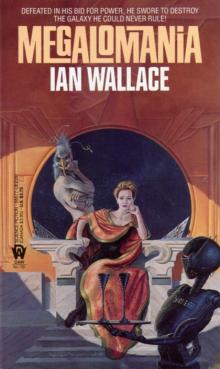 Megalomania
Megalomania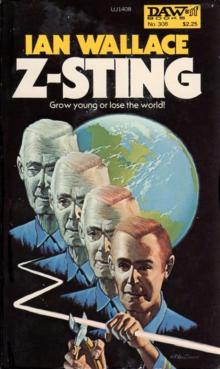 Z-Sting (2475 CE)
Z-Sting (2475 CE)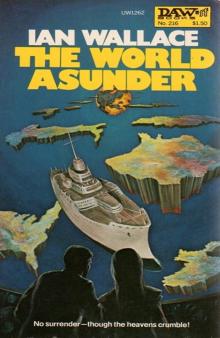 The World Asunder
The World Asunder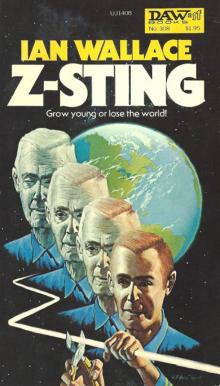 Z-Sting
Z-Sting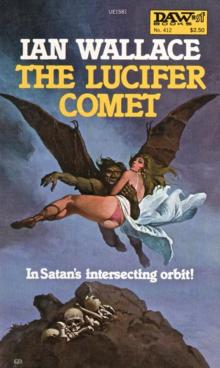 Lucifer Comet (2464 CE)
Lucifer Comet (2464 CE)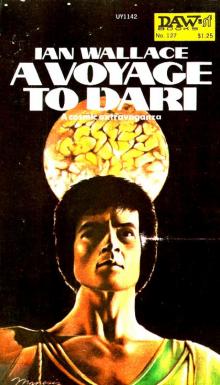 A Voyage To Dari
A Voyage To Dari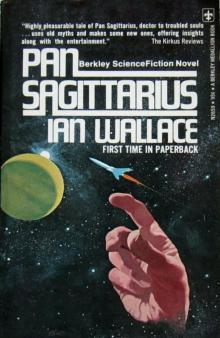 Pan Sagittarius (2509 CE)
Pan Sagittarius (2509 CE)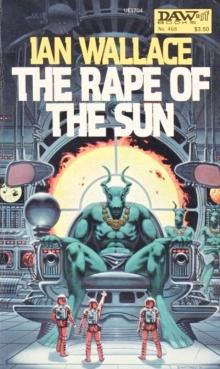 The Rape of The Sun
The Rape of The Sun